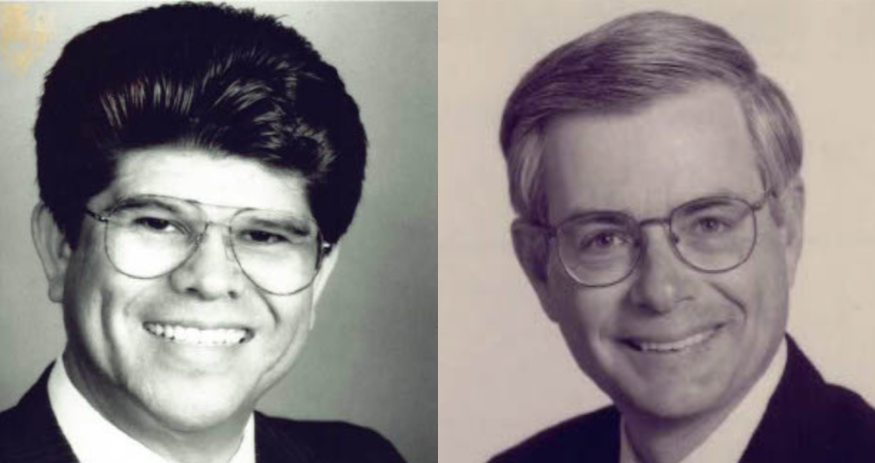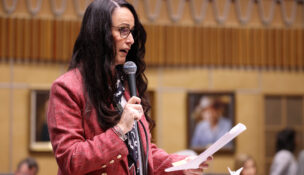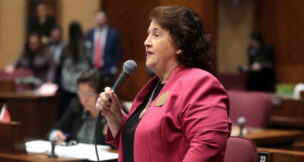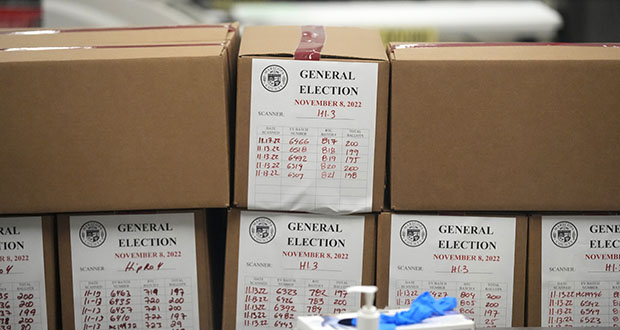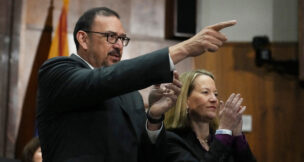A look at the past to imagine tied, flipped Legislature
Jakob Thorington Arizona Capitol Times//October 18, 2024//
A look at the past to imagine tied, flipped Legislature
Jakob Thorington Arizona Capitol Times//October 18, 2024//
It’s been more than three decades since Democrats held control of the Arizona Senate. With Republican majorities thinning in recent years, Democratic leaders are considering plans for a tied or flipped Legislature.
“We are planning to be in the majority,” said Sen. Minority Leader Mitzi Epstein, D-Tempe. “We’ve been working on it for years.”
They have been close. Republicans have held one-seat majorities in both the House and Senate since 2021. The House also saw one-seat Republican majorities in 2019 and 2020.
The last time Democrats held either chamber was in 1991 and 92, when they were the majority party in the Senate. They last controlled the House in 1964.
Democrats have made a strong effort to flip the Legislature this election cycle. They have spent large amounts in several competitive legislative districts, including Legislative District 4, where Democrat Karen Gresham raised $283,000 during the third quarter of campaign finance reporting. Gresham and her running mate Kelli Butler have raised a combined $1.4 million during the election cycle.
Democrats need two seats in both chambers to take majorities. GOP consultant Doug Cole said there are pick-up opportunities in Republican-leaning districts like LD17, where Democrat Kevin Volk emerged as a single-shot, electable candidate against Freedom Caucus Republican Reps. Rachel Jones, R-Tucson; and Cory McGarr, R-Tucson.
Another opportunity is LD23, a blue district where Democrats lost a House seat in 2022 when Rep. Michele Pena, R-Yuma, beat Democrat Jesus Lugo Jr. Lobbyist Barry Aarons said he believes the Democratic candidate Matias Rosales is a stronger option for the district.
The upcoming election will also test how well Democrats can defend their recent gains in swing districts. Aarons said he could also see Republicans taking both House seats in LD13, where former Republican state Rep. Jeff Weninger is running with Rep. Julie Willoughby, R-Chandler.
Rep. Jennifer Pawlik, D-Chandler, is not running for re-election. Democrats Nicholas Gonzales and Brandy Reese are running for the two House seats.
Aarons also said Democrats could win a House seat in LD16, represented by Rep. Keith Seaman, R-Casa Grande, because the Republican Chris Lopez is running with Republican legislative leaders Sen. T.J. Shope, R-Cooldige, and Rep. Teresa Martinez, R-Casa Grande.
“He would make a very good, sound legislator, and he’s got a real good chance of winning that seat,” Aarons said.
In the Senate, Cole said Dems would need to pick up a seat in LD2, where Rep. Judy Schweibert, D-Phoenix, is running against Sen. Shawna Bolick, R-Phoenix, while defending the LD4 and LD9 seats held by Sen. Christine Marsh, D-Phoenix; and Sen. Eva Burch, D-Mesa.
To take the majority in the Senate, Democrats would also likely have to unseat Shope or Sen. J.D. Mesnard, R-Chandler, or beat former Republican Sen. Vince Leach in LD17.
What would a tie look like?
A tie in one or both of the chambers is also a possibility. While the House has never seen a tie in the state’s legislative history, the Senate was tied in 2001 and 2002 during Republican Gov. Jane Hull’s administration.
Under a tied scenario, chamber rules would be changed with both parties having equal power. The 2001 and 2002 legislative sessions had both Republicans and Democrats holding committee chairs. Senators of the opposing party to a committee’s chair were given the vice chair position.
Former Democratic Sen. Pete Rios said in a 2011 interview with the Arizona Memory Project that Democrats cut a deal with then-Senate President Randall Gnant because he seemed “moderate enough for Democrats to work with.”
Rios recalled the conversation he had with Gnant during that 2011 interview: “I said, ‘Randall, if you say you’re going to do it, you’re going to do it, and we’re not leaving here until we sign this thing in blood. Once we leave here, you’re going to be president, you’re going to take a lot of heat, your people are going to call you every name in the book like God’s child, so you better be ready.’ He said, ‘I know it, I know it.’”
Sen. Ken Bennett, R-Prescott, was in the Senate in 2001 and 2002 and said Republicans weren’t happy when they heard that Gnant would be president.
He recounted the caucus organizational meeting prior to the 2001 legislative session where Republicans were set to discuss how they would share power. Not four minutes into the discussion, Gnant informed the caucus he cut a deal to be Senate president.
“We wanted to cut the guy’s head off,” Bennett said.
Part of Gnant’s agreement with Democrats included him voting with them for procedural motions, but he wouldn’t vote for policy he disagreed with.
In a 2006 interview with the Arizona Capitol Times before he retired and moved to Arkansas, Gnant said his biggest disappointment was the tied sessions because it didn’t allow him to show he could advance Republican policy goals with Democratic support.
“I had the votes to put our plan of action into effect if we were as high as 17-13 Republican. I wanted to show that both Republicans and Democrats could work together,” Gnant said in 2006. “History is going to say we worked together because we had to … I had about 22 or 23 people in the middle, and I said to them, ‘You’re the group that’s going to make the policy.’ When you think about it, I had a much easier time than Senate presidents before or since because I had 22 or 23 votes from which to get 16, while Ken Bennett is sitting there trying to get 16 out of 18.”
Bennett said the 15-15 Senate was more focused on the merits of legislation and gridlock rarely occurred.
“Neither side could block the other, but neither side had a numerical advantage to force something through,” Bennett said. “You had to get a vote from someone on the opposite party.”
What would a Democratic majority legislature look like?
A Democratic trifecta of holding the House, Senate and Governor’s Office would allow them to advance their major policy goals that have been blocked or unheard by legislative Republicans.
Policy goals listed on the Senate Democrats website include legislation that would require large employers to offer paid family and medical leave, establishing full-day kindergarten, and reforming the state’s Empowerment Scholarship Account Program.
On a daily operational basis, Epstein said she wants to “restore decorum on the floor and in committees.” She criticized recent Republican committee chairs who have “ousted” people from committee rooms during public testimony.
“If possible, I would like to go full-on English teacher and require citations if people are going to stand around on the floor and make incredibly wild accusations,” Epstein said.
Cole was deputy chief of staff for Republican Gov. Fife Symington in 1991 and 1992 when Democrats had control of the Senate. He said the party operated on majority rules as previous sessions had gone, but said the Governor’s Office was closely coordinated with the Senate because bills needed to get through a Republican majority chamber and a Democratic majority chamber.
“It fostered a closer relationship with leadership and the Ninth Floor day-to-day because of that dynamic,” Cole said.
Aarons, who also served in the Symington administration, said he wasn’t particularly worried about changes in party control of the Legislature because most bills pass the chambers with either unanimous or supermajority support. He said it would only change which legislators are approached by lobbyists to run bills.
“Life will go on,” Aarons said. “Among my colleagues, nobody’s really wringing their hands. The only thing they’re wringing their hands about is impatience to get it over with.”
Under a tied scenario, Aarons said that with the emergence of the Freedom Caucus it was harder for him to imagine a Republican agreeing to work with Democrats in a way that Gnant.
“It’s a lot different this time than it was 25 years ago,” Aarons said.
But a tied chamber could also necessitate cooperation among lawmakers for practical reasons. Bennett said he didn’t think political gridlock would significantly halt legislation.
“One body tied doesn’t create gridlock unless the members allow it to have that effect. You still got to get the budget done,” Bennett said. “You might as well hear a bill (as a committee chair) because you don’t want your bill to be artificially held by somebody in another committee.”

